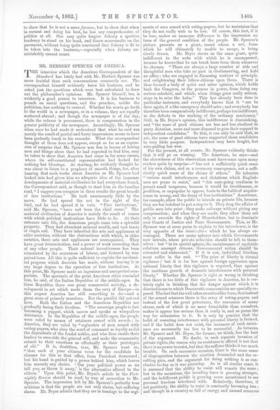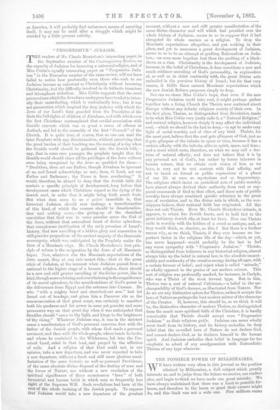MR. HERBERT SPENCER ON AMERICA.
THE interview which the American Correspondent of the Standard has lately had with Mr. Herbert Spencer was more fruitful than such conversations commonly are. The correspondent himself evidently knew his business, and he asked just the questions which were best calculated to draw out the philosopher's opinions. Mr. Spencer himself, too, is evidently a good person to interview. It is his business to preach on social questions, and the preacher, unlike the politician, has nothing to conceal. Whether his words go forth to the world in a newspaper, or in a volume, they are equally scattered abroad ; and though the newspaper is of the day, while the volume is permanent, there is compensation in the greater publicity of the newspaper. Accordingly, Mr. Spencer when once he had made it understood that what he said was merely the result of partial and hasty impressions, seems to have been perfectly frank in his remarks. What the correspondent thought of them does not appear, except so far as an expres- sion of surprise that Mr. Spencer was less in favour of letting men and things alone than he had expected to find him, may be taken to show that America had come in for some curses, where its self-constituted representative had looked for nothing but blessings. At starting, he evidently thought he was about to listen to a prophecy of smooth things, for, after hearing that such books about America as Mr. Spencer had looked into had given him no adequate idea of the immense developments of material civilisation he had everywhere found, the Correspondent said, as though to start him on the familiar road," I suppose you recognise in these results the great benefit of free institutions," He took uncommonly little by the move. He had spread the net in the sight of the bird, and he had spread it in vain. "Free institutions," said Mr. Spencer, "have not been the chief cause." The material civilisation of America is mainly the result of causes
with which political institutions have little to do. At their entrance into life, the American people came into a splendid property. They had abundant mineral wealth, and vast tracts of virgin soil. They have inherited the arts and appliances of older societies, without the obstructions with which, in older societies, these arts and appliances are accompanied. They have great determination, and a power of work exceeding that of any other people. Their natural inventiveness has been stimulated by the scarceness of labour, and fostered by wise patent laws. All this is quite sufficient to explain the mechani- cal progress which America has made, without tracing it in any large degree to the operation of free institutions. At this point, Mr. Spencer made an ingenious and unexpected com- parison. The spectacle of the great American cities reminded him, he said, of the Italian Republics of the middle-ages. In these Republics there was great commercial activity, a de- velopment in art which made them the envy of Europe—in this respect America has still something to do—and a great store of princely mansions. But the parallel did not end
here. Both the Italian and the American Republics are \ gradually losing their freedom. "The sovereign people is fast ' becoming a puppet, which moves and speaks as wirepullers determine. In the Republics of the middle-ages, the people were .ruled by means of retainers armed with swords ; in America, they are ruled by " regimehts of men armed with voting-papers, who obey the word of command as loyally as did the dependents of the feudal nobles, and who thus enable their leaders to over-ride the general will, and make the community submit to their exactions as effectually as their prototypes of old." It is, doubtless, true, Mr. Spencer went on, " that each of your citizens votes for the candidate he chooses for this or that office, from President downward ; but his hand is guided by a power behind him, which leaves him scarcely any choice. Use your political power as we tell you, or throw it away,' is the alternative offered to the citizen." Upon this point, Mr. Bryce's article in the Fort- nightly 1?eview should be read, by way of correction to Mr. Spencer. The impression left by Mr. Spencer's perfectly true criticism is that the people are not only slaves, but suffering slaves. Mr. Bryce admits that they are in bondage to the regi-
ments of men armed with voting-papers, but he maintains that they do not really wish to be free. Of course, this fact, if it be true, makes an immense difference in the impression we form of the general condition of the people. Mr. Spencer's picture presents us a giant, round whom a net, from which lie will ultimately be unable to escape, is being
slowly drawn. Mr. Bryce shows us the same giant, quite indifferent to the webs with which he is encompassed, because he knowsthat he can break loose from them whenever he chooses. "There are always a large number of able and thoughtful men who take no part in electioneering, and hold DO office ; who are engaged in discussing matters of principle, and enlightening their fellow-citizens upon them. There is thus formed a body of quiet and sober opinion, which holds back the Congress, or the persons in power, from doing any serious mischief, and which, when things grow really serious, steps in to seize the helm." This has already been done in particular instances, and everybody knows that it "can be done again, if a like emergency should arise ; and everybody has therefore been comparatively indifferent,perhaps too indifferent, to the defects in the working of the ordinary machinery." Still, in Mr. Bryce's opinion, this indifference is diminishing, and the mass of good citizens are less and less obedient to party dictation, more and more disposed to give their support to independent candidates." To this, it can only be said that, as yet, the mass of good citizens have supported these candidates to very little purpose. Independence may have fought, but wire-pulling has won. For the present, at all events, Mr. Spencer evidently thinks that it will go on winning. The American, he says—and the shrewdness of this observation must have come upon many readers quite by surprise—" has not a sufficiently quick sense of his own claims, and as a necessary consequence, not a suffi- ciently quick sense of the claims of others." He tolerates "various small interferences and dictations which English- men are prone to resist," and "this easy-going readiness to permit small trespasses, because it would be troublesome, or profitless, or unpopular to oppose, leads to the habit of acquies- cence in wrong, and the decay of free institutions." Americans, for example, allow the public to intrude on private life, because they are too indolent to put &stop to it. They drag the affairs of public men into print ; they make railways without giving any compensation ; and when they are made, they allow them not only to override the rights of Shareholders, but to dominate over Courts of Justice and State Governments. This, as Mr. Spencer was at some pains to explain to his interviewer, is the very opposite of the laissez-faire which be has always en- couraged. There are many spheres into which Governments now intrude, where private activities should be left to them- selves ; but "in its special sphere, the maintenance of equitable relations amongst citizens, Governmental action should be extended and elaborated." If it is not, individual freedom must suffer in the end. " The price of liberty is eternal vigilance f but it is far less against foreign aggression upon national liberty that this vigilance is required, than against the insidious growth of domestic interferences with personal liberty." Whether Mr. Spencer is right or wrong in thinking that there is too little of this vigilance in America, he is cer- tainly right in thinking that the danger against which it is directed is one to which Democratic communities are specially ex- posed. The fact that the evil takes an unfamiliar form, that instead of the armed retainers there is the array of voting-papers, and instead of the few great potentates, the concourse of many atoms, each of which is no more formidable than ourselves, makes it appear less serious than it really is, and so paves the way for submission to it. It is only by practice that the habit of resenting interference with personal liberty is formed, and if the habit does not exist, the instances of such resist- ance are necessarily too few to be successful. As between Mr. Spencer and Mr. Bryce, the former, we think, has the best of the argument. No doubt, in each separate invasion of private rights, the reason why no resistance is offered .is not that there is no power to resist, but that the sufferer thinks it too much trouble. On each successive occasion, there is the same sense of disproportion between the exertion .demanded and the re- sulting gain, and the argument for doing nothing is as con- clusive to-day as it was yesterday. As in all similar cases, it is assumed that the ability to resist will remain the same ; but in the meantime, the invading force is growing stronger, and the indifferent public is growing more accustomed to see personal freedom interfered win. Relatively, therefore, if not positively, the ability to resist is constantly becoming less ; and though in a country so full of energy and unused resource
as America, it will probably find unforeseen means of asserting itself, it may not be until after a struggle which might be avoided by a little present activity.



































 Previous page
Previous page